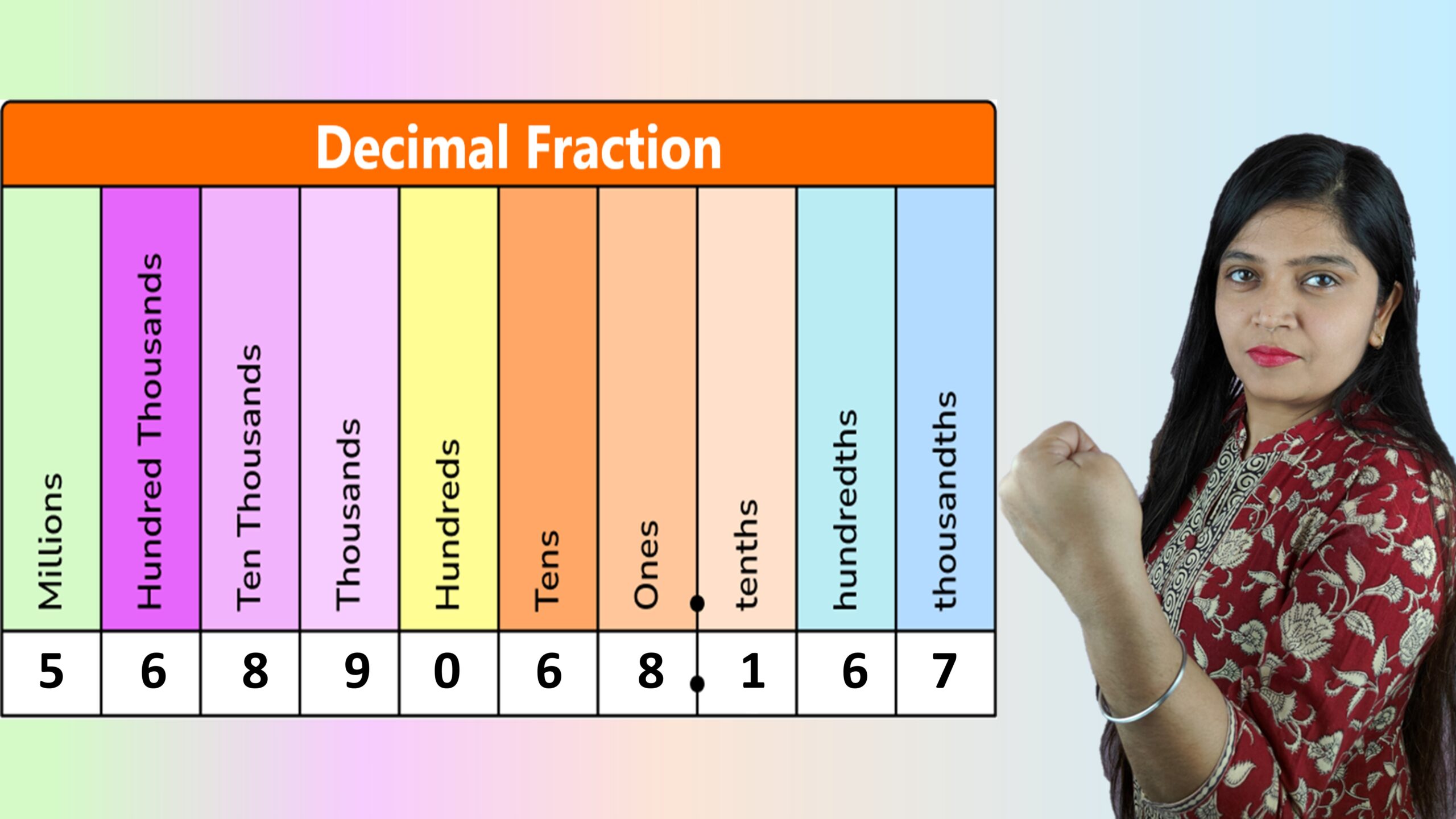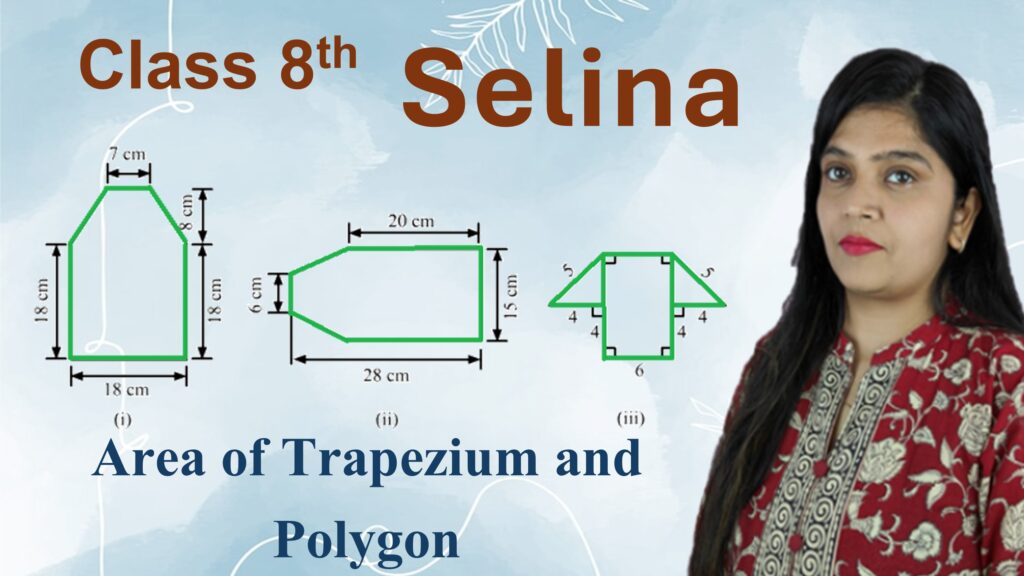Exercise: 5-A
Q1: Write each of the following decimals in figures:
i. Seventy three point eight four
Step 1: “Seventy three” means 73.
Step 2: “Point eight four” means .84.
Step 3: So, combining both gives 73.84.
Answer: 73.84
ii. Three hundred forty six point zero nine five
Step 1: “Three hundred forty six” means 346.
Step 2: “Point zero nine five” means .095.
Step 3: So, combining both gives 346.095.
Answer: 346.095
iii. Five hundred eight point two six
Step 1: “Five hundred eight” means 508.
Step 2: “Point two six” means .26.
Step 3: So, combining both gives 508.26.
Answer: 508.26
iv. Nineteen point six one eight
Step 1: “Nineteen” means 19.
Step 2: “Point six one eight” means .618.
Step 3: So, combining both gives 19.618.
Answer: 19.618
v. Zero point seven nine three
Step 1: “Zero” means 0.
Step 2: “Point seven nine three” means .793.
Step 3: So, combining both gives 0.793.
Answer: 0.793
vi. Ten point zero zero seven
Step 1: “Ten” means 10.
Step 2: “Point zero zero seven” means .007.
Step 3: So, combining both gives 10.007.
Answer: 10.007
Q2: Write the place value of each digit in each of the following decimals:
i. 46.38
Step 1: 4 is in the tens place → Place value = \( 4 \times 10 = 40 \)
Step 2: 6 is in the units place → Place value = \( 6 \times 1 = 6 \)
Step 3: 3 is in the tenths place → Place value = \( 3 \times \frac{1}{10} = \frac{3}{10} \)
Step 4: 8 is in the hundredths place → Place value = \( 8 \times \frac{1}{100} = \frac{8}{100} \)
Answer: \(40, 6, \frac{3}{10}, \frac{8}{100}\)
ii. 57.095
Step 1: 5 is in the tens place → Place value = \( 5 \times 10 = 50 \)
Step 2: 7 is in the units place → Place value = \( 7 \times 1 = 7 \)
Step 3: 0 is in the tenths place → Place value = \( 0 \times \frac{1}{10} = 0 \)
Step 4: 9 is in the hundredths place → Place value = \( 9 \times \frac{1}{100} = \frac{9}{100} \)
Step 5: 5 is in the thousandths place → Place value = \( 5 \times \frac{1}{1000} = \frac{5}{1000} \)
Answer: \(50, 7, 0, \frac{9}{100}, \frac{5}{1000}\)
iii. 132.405
Step 1: 1 is in the hundreds place → Place value = \( 1 \times 100 = 100 \)
Step 2: 3 is in the tens place → Place value = \( 3 \times 10 = 30 \)
Step 3: 2 is in the units place → Place value = \( 2 \times 1 = 2 \)
Step 4: 4 is in the tenths place → Place value = \( 4 \times \frac{1}{10} = \frac{4}{10} \)
Step 5: 0 is in the hundredths place → Place value = \( 0 \times \frac{1}{100} = 0 \)
Step 6: 5 is in the thousandths place → Place value = \( 5 \times \frac{1}{1000} = \frac{5}{1000} \)
Answer: \(100, 30, 2, \frac{4}{10}, 0, \frac{5}{1000}\)
iv. 19.006
Step 1: 1 is in the tens place → Place value = \( 1 \times 10 = 10 \)
Step 2: 9 is in the units place → Place value = \( 9 \times 1 = 9 \)
Step 3: 0 is in the tenths place → Place value = \( 0 \times \frac{1}{10} = 0 \)
Step 4: 0 is in the hundredths place → Place value = \( 0 \times \frac{1}{100} = 0 \)
Step 5: 6 is in the thousandths place → Place value = \( 6 \times \frac{1}{1000} = \frac{6}{1000} \)
Answer: \(10, 9, 0, 0, \frac{6}{1000}\)
Q3: Write each of the following decimals in expanded form:
i. 53.48
Step 1: 5 is in tens place → \( 5 \times 10 = 50 \)
Step 2: 3 is in ones place → \( 3 \times 1 = 3 \)
Step 3: 4 is in tenths place → \( \frac{4}{10} \)
Step 4: 8 is in hundredths place → \( \frac{8}{100} \)
Answer: 50 + 3 + \( \frac{4}{10} \) + \( \frac{8}{100} \)
ii. 6.927
Step 1: 6 is in ones place → \( 6 \)
Step 2: 9 is in tenths place → \( \frac{9}{10} \)
Step 3: 2 is in hundredths place → \( \frac{2}{100} \)
Step 4: 7 is in thousandths place → \( \frac{7}{1000} \)
Answer: 6 + \( \frac{9}{10} \) + \( \frac{2}{100} \) + \( \frac{7}{1000} \)
iii. 10.084
Step 1: 1 is in tens place → \( 10 \)
Step 2: 0 is in ones place → \( 0 \)
Step 3: 0 is in tenths place → \( 0 \)
Step 4: 8 is in hundredths place → \( \frac{8}{100} \)
Step 5: 4 is in thousandths place → \( \frac{4}{1000} \)
Answer: 10 + \( \frac{8}{100} \) + \( \frac{4}{1000} \)
iv. 8.005
Step 1: 8 is in ones place → \( 8 \)
Step 2: 0 is in tenths place → \( 0 \)
Step 3: 0 is in hundredths place → \( 0 \)
Step 4: 5 is in thousandths place → \( \frac{5}{1000} \)
Answer: 8 + \( \frac{5}{1000} \)
v. 274.503
Step 1: 2 is in hundreds place → \( 200 \)
Step 2: 7 is in tens place → \( 70 \)
Step 3: 4 is in ones place → \( 4 \)
Step 4: 5 is in tenths place → \( \frac{5}{10} \)
Step 5: 0 is in hundredths place → \( 0 \)
Step 6: 3 is in thousandths place → \( \frac{3}{1000} \)
Answer: 200 + 70 + 4 + \( \frac{5}{10} \) + \( \frac{3}{1000} \)
vi. 31.02
Step 1: 3 is in tens place → \( 30 \)
Step 2: 1 is in ones place → \( 1 \)
Step 3: 0 is in tenths place → \( 0 \)
Step 4: 2 is in hundredths place → \( \frac{2}{100} \)
Answer: 30 + 1 + \( \frac{2}{100} \)
vii. 1635.72
Step 1: 1 is in thousands place → \( 1000 \)
Step 2: 6 is in hundreds place → \( 600 \)
Step 3: 3 is in tens place → \( 30 \)
Step 4: 5 is in ones place → \( 5 \)
Step 5: 7 is in tenths place → \( \frac{7}{10} \)
Step 6: 2 is in hundredths place → \( \frac{2}{100} \)
Answer: 1000 + 600 + 30 + 5 + \( \frac{7}{10} \) + \( \frac{2}{100} \)
Q4: Write each of the following as a decimal number:
i. \(60 + 8 + \frac{4}{10} + \frac{5}{100}\)
Step 1: \(60 + 8 = 68\)
Step 2: \( \frac{4}{10} = 0.4 \), \( \frac{5}{100} = 0.05 \)
Step 3: Combine: \(68 + 0.4 + 0.05 = 68.45\)
Answer: 68.45
ii. \(500 + 4 + \frac{6}{10} + \frac{8}{100} + \frac{3}{1000}\)
Step 1: \(500 + 4 = 504\)
Step 2: \( \frac{6}{10} = 0.6 \), \( \frac{8}{100} = 0.08 \), \( \frac{3}{1000} = 0.003 \)
Step 3: Combine: \(504 + 0.6 + 0.08 + 0.003 = 504.683\)
Answer: 504.683
iii. \(300 + 20 + \frac{1}{10} + \frac{6}{1000}\)
Step 1: \(300 + 20 = 320\)
Step 2: \( \frac{1}{10} = 0.1 \), \( \frac{6}{1000} = 0.006 \)
Step 3: Combine: \(320 + 0.1 + 0.006 = 320.106\)
Answer: 320.106
iv. \(2000 + 80 + \frac{4}{100} + \frac{8}{1000}\)
Step 1: \(2000 + 80 = 2080\)
Step 2: \( \frac{4}{100} = 0.04 \), \( \frac{8}{1000} = 0.008 \)
Step 3: Combine: \(2080 + 0.04 + 0.008 = 2080.048\)
Answer: 2080.048
v. \(6000 + 3 + \frac{2}{10} + \frac{7}{1000}\)
Step 1: \(6000 + 3 = 6003\)
Step 2: \( \frac{2}{10} = 0.2 \), \( \frac{7}{1000} = 0.007 \)
Step 3: Combine: \(6003 + 0.2 + 0.007 = 6003.207\)
Answer: 6003.207
Q5: Write each of the following numeral as a decimal:
i. \(2\frac{7}{10}\)
Step 1: Convert to improper: \(2 + \frac{7}{10} = 2.7\)
Answer: 2.7
ii. \(43\frac{3}{10}\)
Step 1: Convert to decimal: \(43 + \frac{3}{10} = 43.3\)
Answer: 43.3
iii. \(6\frac{15}{100}\)
Step 1: Convert to decimal: \(6 + \frac{15}{100} = 6.15\)
Answer: 6.15
iv. \(18\frac{9}{100}\)
Step 1: Convert to decimal: \(18 + \frac{9}{100} = 18.09\)
Answer: 18.09
v. \(5\frac{123}{1000}\)
Step 1: Convert to decimal: \(5 + \frac{123}{1000} = 5.123\)
Answer: 5.123
vi. \(4\frac{37}{1000}\)
Step 1: Convert to decimal: \(4 + \frac{37}{1000} = 4.037\)
Answer: 4.037
vii. \(10\frac{8}{1000}\)
Step 1: Convert to decimal: \(10 + \frac{8}{1000} = 10.008\)
Answer: 10.008






Leave a Comment